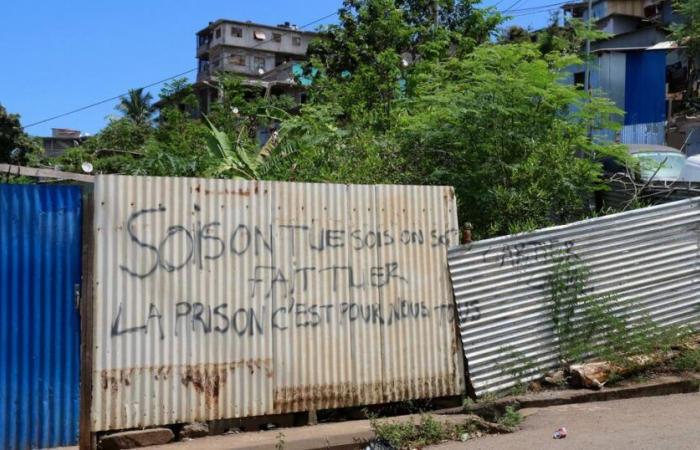“Chronic and alarming overcrowding”, “unworthy accommodation conditions”, “endangering the physical and psychological integrity of detainees”, “feeling of abandonment”… Three reports reveal that the various administrative detention centers are facing a intense migratory pressure.
Suroccupation “alarming”detainees and migrants abandoned to their own devices and rights violated in an almost generalized manner: the General Controller of places of deprivation of liberty (CGLPL) drew up in three reports published on Wednesday a damning picture of the situation in Mayotte. Focusing on the Majicavo penitentiary center, the Mamoudzou hospital center – notably its psychiatric unit – and the various administrative detention facilities in the French archipelago in the Indian Ocean, which is experiencing very strong migratory pressure, these reports follow visits carried out in October 2023.
They are accompanied by a letter from CGLPL Dominique Simonnot to Prime Minister Michel Barnier dating from September 2024, in which the Controller reports “conditions of confinement and care seriously infringe on the fundamental rights and dignity of people”. The observation common to the different places is overwhelming: “unsuitability of premises”, “alarming suroccupation”, “forced idleness”, “lack of access to running water”, “unsuitable and insufficient diet” or even “extremely serious hygiene deficiencies”Dominique Simonnot list. “Everywhere, people deprived of their liberty are hampered in the exercise of their rights”she adds, regretting that previous recommendations from the CGLPL dating back to 2016 and 2019 have remained a dead letter.
The report on the Majicavo penitentiary center, in the suburbs of Mamoudzou, is the most scathing. Since its commissioning in 2015, it has experienced “chronic overcrowding which is only increasing”denounce the CGLPL controllers. At the time of their visit, 555 detainees were housed, including 195 on a mattress on the floor. Since then, the situation has gotten worse. As of October 30, 2024, the prison showed an overcrowding of 161%, with 671 people detained for 415 beds available, according to a letter from Minister of Justice Didier Migaud in response to CGLPL observations.
“Left to their own devices”
Beyond prison overcrowding, it is the current practices at Majicavo that worry the CGLPL. “The competence and investment of certain members of middle management, notoriously insufficient, lead to unsuitable professional postures, marked by xenophobia both towards prisoners, 64% of whom are foreigners, and within the staff themselves. of supervision and vis-à-vis non-Mahorais management”says the report. “Largely left to their own devices, poorly fed and poorly clothed, the detainees find it all the more difficult to perceive themselves as subjects of the law as they are rarely treated as such”according to the same source. The lack of associations specializing in foreigners' rights, interpreters or lawyers working in the prison center is also denounced. Finally, the report notes the “countless number of testimonies from detainees” saying that they never have any response to their requests, believing that they conceive of them “a feeling of bitterness and abandonment insufficiently perceived by the authorities”.
Enough to shed a different light on the mutiny and the brief hostage-taking of guards which broke out in Majicavo in September 2024, which required the intervention of the GIGN, the elite unit of the gendarmerie. A few days later, the director of the establishment, who arrived in January 2024, resigned for “attract attention” on working conditions. On November 15, ten detainees who participated in the mutiny, including several imprisoned for murder or attempted murder, were sentenced to prison terms of 1.5 to three years.
The only minister who responded to the CGLPL, Didier Migaud said he was aware of the “seriousness of the situation observed” in the Mahorais penitentiary establishment, defending staff with very difficult working conditions and ensuring that a “voluntary decluttering policy” was put in place by the prison administration. The Minister of Justice confirms that a second penitentiary center, with a planned capacity of 400 places, announced in 2022, will be built. But the project comes up against the lack of available land, a recurring problem in this 376 km2 department which has seen its population double in twenty years to reach 321,000 people on January 1, according to an INSEE estimate.






